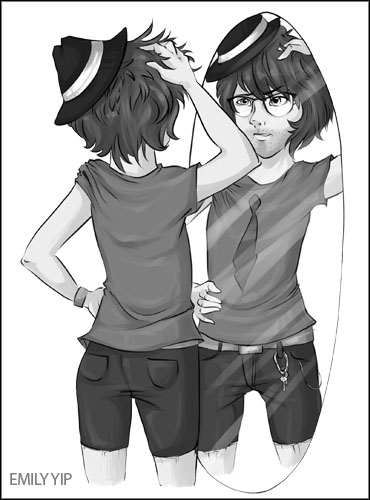
Chances are that if Aragon experienced a hipster invasion in the near future, not many people would notice. Perhaps Aragon has already been infiltrated by the hipster kind. Perhaps, however, the average Aragon student just does not know what hipster is.
Junior Brittany McOmber says that “There are so many different kinds of hipsters I don’t even know [what the definition of hipster is] anymore.” She is not alone. The image of a hipster is blurred. Different people see the image of a hipster differently.
To some, the hipster is defined by associations to items and characteristics. “A hipster is fixie bikes, handle bar moustaches, cuffed pants, obscure music, irony, vintage, and cheap beer,” says junior Dana Pierce.
To others, the hipster is defined by his or her actions. “A hipster is a person that does the hipster head bob. All the hipsters do it when listening to a song with a hip beat,” says sophomore Troy Young.
And yet to others, hipsterdom has become a lifestyle choice. “Hipster is not trying,” says senior Brynn Mitchell.
While many students seem to correlate general characteristics with the hipster image, most are unable to quite put their tongue on the image of hipster.
“[To be hipster is] being into things that aren’t popular and into things that most people aren’t aware of,” says senior Reyna Saraos. To this end most students agree. Hipsters are all about being “in the know.” But after this one agreement, most students diverge in definition.
Senior Chris Wallace suggests that perhaps there just isn’t one solid image of hipster. “I’d say a hipster is someone who has more of an eclectic taste in fashion, music, and movies. Someone who doesn’t dress like other people, and listens to music that isn’t considered ‘popular,’” he says.
But then, the question arises: How do you categorize a group of people who share the commonality of not dressing like others, of not having the same music taste of others, of not liking the same movies as others? If hipster is defined by individualism, is every individual a hipster? Most students would care to disagree.
Many students believe that hipsterism is not about individualism, but about the image of individualism. Junior Sam Sokolsky says that “A lot of people want to be hipsters try to be original and end up just following someone else instead. When people try to be original they end up just following someone else’s definition of non-conformism.”
Moreover, the hipster movement has taken the image of being a “try-hard.” Junior Derrick Leong says that “[Hipsters] say they are non-conforming but all they are doing is trying hard to dress well and look better than other people.”
It is for these reasons that many students scorn hipsters. Senior Thomas Pauly says “If I were called a hipster I’d be disappointed in myself. I don’t like hipsters because they think they are better than everyone else.
Ironically, the cultural movement centered around carrying relaxed easy known-how attitude has become a cultural movement about always being in the “know,” no matter the costs. Mitchell comments saying that “These days, the hipster movement is so overanalyzed that it has become exactly what it began fighting against. Now, everyone is working for it.”
Another irony about the hipster movement is that the movement originally designed to reject the mainstream, has become mainstream. Freshmen John Graham says “‘Hipster’ can just be used to mean regular kids now.”
Regardless, the hipster movement is not dead and gone. Wallace says that a lot of the death of the hipster movement is due to public perception of the movement. “I think [hipster is] just another word. Nowadays it seems to carry a negative connotation, but really it’s just a word people use because they can’t categorize someone’s style. I would say it’s pretty neutral. It can be either [positive] or [negative] depending on the person whom is called a hipster.”





